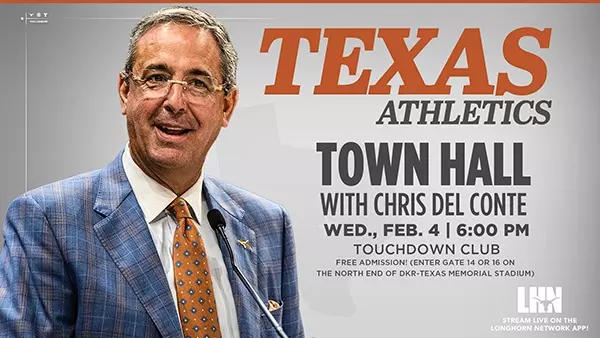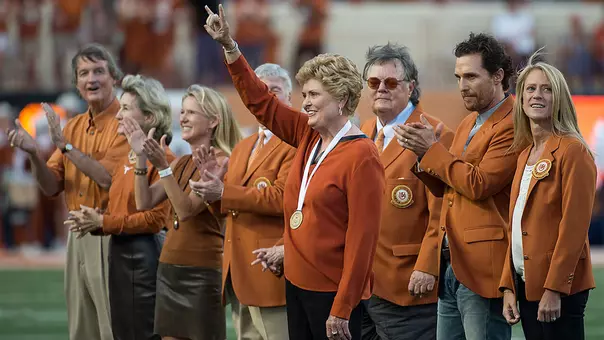The University of Texas at Austin Athletics
History of the Clyde Littlefield Texas Relays
02.07.2006 | Texas Athletics
In the progressive country music era of the 1970s, Waylon Jennings paid tribute to the western swing sound of the late Bob Wills when he sang, "it don't matter who's in Austin, Bob Wills is still the king."
Those who have followed the history of track at The University of Texas--and old timers would make the case it transcends any sport--would tell that same story about a man who, as a legendary athlete and coach, was an enduring presence for almost half a century as a Longhorn.
His name was Clyde Littlefield.
Consider this: Littlefield, who came to the University as a freshman in the fall of 1912 earned a dozen letters for varsity competition--a feat never matched--in football, basketball and track. As a football player, he pioneered the forward pass in the collegiate game, and was named to the collegiate all-state team three times. In basketball, he played on three undefeated teams and served as team captain in 1915. Forty years after his final game, the Helms Athletic Foundation placed him on its 1915 basketball all-American team. As a sprinter and hurdler in track, he lost only one hurdle race in four years of competition. He also pitched and won two baseball games, but didn't have time to earn a letter. But as remarkable as he was as a student-athlete, that was only the beginning.
Without question, he was the most dominant athlete in the first 20 years of Texas athletics.
When he graduated from Texas, he went directly into coaching at Greenville High School, where his football teams lost but one game in three years and his 1919 team outscored its opponents 283-0. And while football was where he earned much of his fame, it was significant that his track team also claimed a state championship.
In 1920, after a stint in World War I, he came to the University as head track coach, freshman football and freshman basketball coach. He would eventually serve as head football coach from 1927 through 1933, during which time he compiled a won-lost-tied record of 44-18-4, winning two Southwest Conference titles and beating rival Oklahoma four out of five meetings.
But Clyde Littlefield's legacy would come in the sport where giant men throw, agile men vault and jump and runners run. Littlefield became "Mr. Track" at Texas.
When he retired as head track coach in 1961 after 41 seasons, his teams had won 25 Southwest Conference championships, and finished second 14 times.
While he would produce all-star athletes in many events, it would be in the world of speed that Littlefield would excel. At major relay meets around the country, Texas teams under Littlefield won more relay championships than any other school in the nation. They would win 131 titles in six different meets, including 54 at the Texas Relays, 32 in the Kansas Relays, 22 in the Drake Relays, 11 in the California Relays, eight in the L.A. Coliseum Relays and four in the Penn Relays.
His teams set four world records and five national records, and 11 of his stars won individual NCAA honors.
In 1925, the first spring of Memorial Stadium, Littlefield started the Texas Relays, and he served as the meet director for the next 30 years.
In the book, "Champions," the definitive chronicle of Texas Track written before Littlefield's death, he reflected on his career: "Winning was never the whole thing with me," he said. "Development of young men was important -- and rewarding. Personal honors are fine for a coach, but what really counts are the friends and the achievements made by the boys he has coached.
"The coach of today doesn't have the opportunity to work with the individuals as I did, and I always had good boys to work with. Very few gave me any trouble. I was able to get closer to the boys in the old days. Now there's too much pressure to win."
He coached national and international teams, and became a goodwill ambassador for track and field all over the world. Clyde Littlefield was 88 when he died in 1981.
And the legacy he left was not only in the championships and races that he won, or the Texas Relays that he built, but in the lives that he touched.
"Athletics, in addition to helping the physical development of the body, teaches young men the value of working together and helping one another out. I always wanted each of my athletes to think to the future, to realize that his athletic competition and his teamwork were steps toward his future. It gives me great pride to know that young men I've coached have gone on to become successful in virtually every professional field--doctors, lawyers, bankers, university presidents, teachers, coaches, ranchers, heads of large business firms...."





